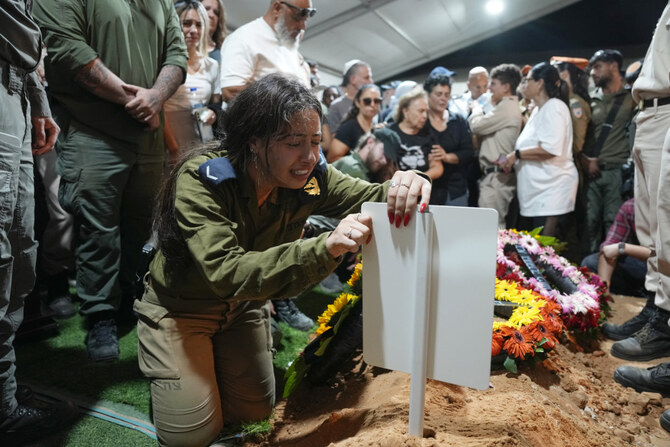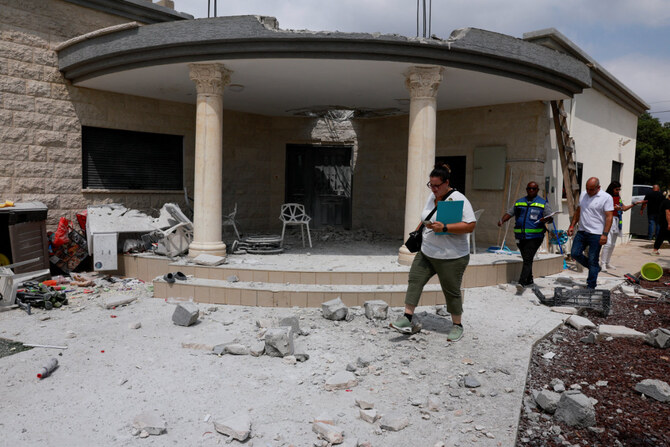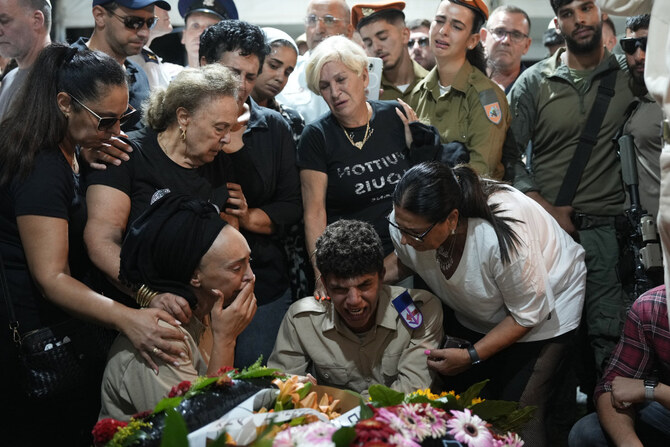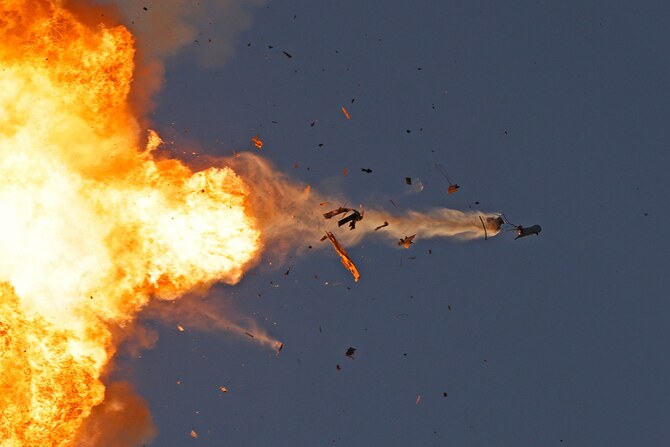BEIRUT: Israel launched a wave of airstrikes across southern Lebanon early on Sunday in what it called a preemptive strike to avert a large Hezbollah rocket and missile attack.
Hezbollah said it fired hundreds of rockets and drones to avenge the assassination of the party’s military commander, Fuad Shukr, in Beirut last month.
Both sides halted the heavy exchange of fire by mid-morning, signaling no immediate escalation.
After more than 10 months of cross-border hostilities, there were fears a large-scale Israeli onslaught could escalate into all-out war.
Caretaker Prime Minister Najib Mikati initiated a series of contacts with Lebanon’s allies to halt any escalation.
FASTFACT
Fears have spiked since Fouad Shukr’s killing that the cross-border violence could degenerate into all-out conflict between Hezbollah and Israel.
He said that “the priority is to stop the Israeli aggression first” before implementing a UN resolution calling for an end to hostilities.
According to his media office, Mikati said that “Lebanon supports international efforts that may lead to a ceasefire in Gaza.”
The Egyptian Foreign Ministry warned of “the dangers of opening a new war front in Lebanon.”
Egypt emphasized “the importance of maintaining Lebanon’s stability, sovereignty, and avoiding the risks of the region slipping into a state of total instability.”
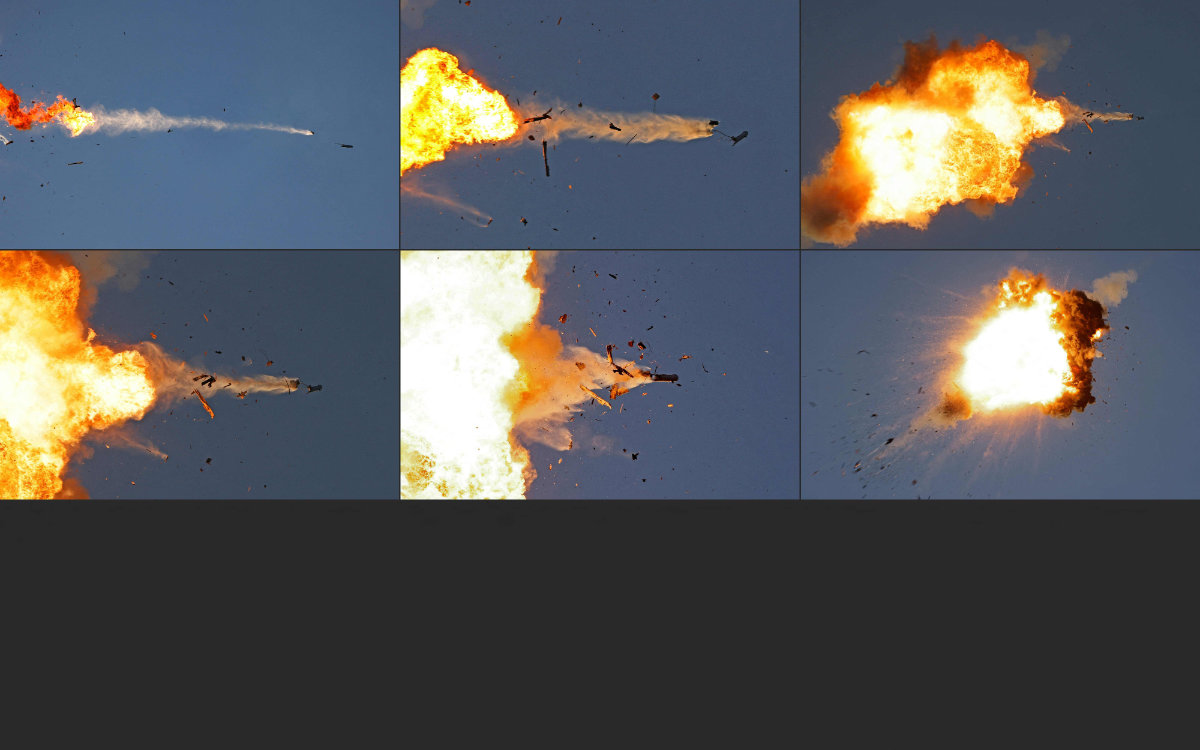
In this combination of pictures created on August 25, 2024, photos taken from a position in northern Israel show a Hezbollah UAV being intercepted by the Israeli air force over northern Israel on August 25, 2024. (AFP)
In a joint statement, UNIFIL and the office of the UN Special Coordinator for Lebanon described the developments across the Blue Line as “concerning” and urged “all parties to deescalate strongly.”
At 4:30 a.m., residents of southern Lebanon woke to the sound of airstrikes and missile explosions.
A resident in the Nabatieh area said: “The ground was shaking beneath our feet, and the sound of falling missiles was deafening. Everyone began asking what was happening.”
A statement by the Israeli army circulating on social media asked residents near Hezbollah’s operational areas to move away immediately.
The message was directed at Lebanese civilians located south of the Litani River.
The noise of Israeli airstrikes merged with the sounds of Hezbollah’s rocket launchers firing toward Israeli military positions, while sirens sounded in northern Israel and among UNIFIL stations in southern Lebanon.
Israel’s Ben Gurion Airport was closed to air traffic.
Shortly after 6 a.m., a preliminary statement issued by Hezbollah confirmed “the initial response to the assassination of Shukr.”
Hezbollah said that its fighters “are currently at their highest state of readiness and will be vigilant against any violations or acts of aggression, particularly if civilians are harmed, as the repercussions will be severe and harsh.”
In a second statement, issued less than an hour later, the group said that “the first phase had been successfully completed.”
This involved “targeting Israeli barracks and positions to facilitate the passage of offensive drones toward their intended objective deep within the entity, and the drones proceeded as planned,” it said.
Hezbollah claimed to have launched more than 320 Katyusha rockets toward Israeli positions.
Targets included the Meron base, theNaveh Ziv base, Zaatoun base, Zaoura bases, Al-Sahl base, the Keila barracks in the occupied Syrian Golan, the UF barracks in the occupied Syrian Golan, the Nafah base in the occupied Syrian Golan, the Yarden base in the occupied Syrian Golan, the Ein Zeytim base, and the Ramot Naftali barracks.
Israeli media reports said that homes, buildings, and a kindergarten in Acre had been damaged, with a woman treated for minor injuries from shrapnel.
Around 8 a.m., hostilities on both sides of the border eased.
A Hezbollah official said that the response to the assassination of Shukr had been delayed due to political considerations, primarily the negotiations concerning Gaza.
Hezbollah said it was keen to ensure that its response would not escalate into a “full-scale war.”
The Israeli Broadcasting Authority reported that an Israeli political source confirmed “the conclusion of the military operation by Israel and that the situation now rests with Hezbollah.”
The source said that “Hezbollah launched a substantial attack on strategic installations in central Israel, which was successfully intercepted.”
Israeli media said that one of Hezbollah’s targets was the Glilot area, on the outskirts of Tel Aviv, where the Mossad headquarters and the military intelligence Unit 8200, along with other strategic facilities, are located.
Prime Minister Benjamin Netanyahu said that Israel “monitored Hezbollah’s preparations to attack Israel, and we directed the military to take the initiative in neutralizing those threats.”
He claimed that the army destroyed thousands of rockets aimed at northern Israel and eliminated other threats.
Israeli army spokesperson Avichay Adraee claimed that about 100 warplanes destroyed thousands of Hezbollah missile launchers in southern Lebanon.
Adraee claimed that most of these launchers were directed toward the northern region, with some aimed at the central part of the country. More than 40 launch positions were targeted.
The Israeli Broadcasting Corporation, citing the army, denied that any Israeli military base was damaged.
The Israeli Army Radio said that Defense Minister Yoav Gallant spoke with his US counterpart, Lloyd Austin, to assess the developments.
The US Department of Defense said Austin “affirmed Washington’s commitment to defending Israel against any attacks from Iran, its partners and proxies in the region.”
The Washington Post quoted Israeli officials as saying that the jamming systems had succeeded in protecting Tel Aviv from Hezbollah’s attacks.
Hezbollah denied Israeli claims about its “preemptive actions, the targets it achieved, and its disruption of the resistance’s attack.”
The Israeli raids began at dawn and continued until 10:30 a.m.
The targets included the outskirts and valleys of the towns of Ain Qana, Kfar Kila, Al-Lwaiza, Bouslaiya, Rashaf, At Tiri, Haddatha, Kounine, Zibqin, Yater, Seddiqine, Haris, Deir Seryan, Tallouseh, El Qsair, Naqoura, Tayr Harfa, Majdal Zoun, Alma Al-Shaab, Jebbayn, Chihine, Mahmoudiya, Jabal er Rafiaa, Berghoz, Dlafy, Mays Al-Jabal, Khiam and Markaba.
They also targeted Kfar Melki, Iqlim Al-Tuffah, and towns in the district of Nabatieh.
The Ministry of Health reported three Lebanese fatalities, including a member from the Amal Movement, Hezbollah’s ally, and two Syrian fatalities.
Hezbollah mourned two members: Khodr Moussa Sweid, 37, and Hamza Mohammed Zalghout, 32, from the town of Haris in southern Lebanon.


